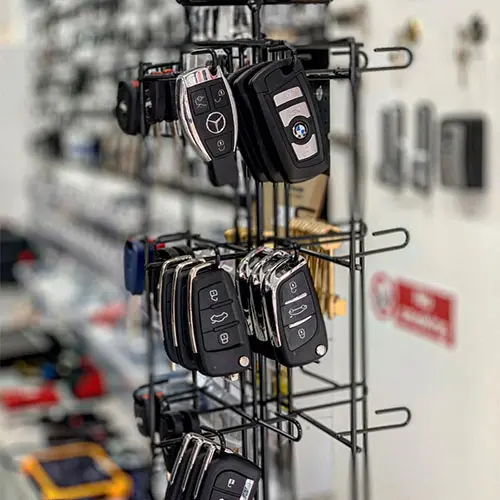
20
JulyYou'll Never Be Able To Figure Out This Emergency Car Key Repair's Tricks
Emergency Car Key Repair: A Comprehensive Guide
Car keys are an important part of vehicle ownership, and their abrupt malfunction can cause substantial inconvenience. Whether lost, broken, or harmed, understanding how to manage emergency car key repair is important for any vehicle owner. This extensive guide checks out numerous elements of car key repair and replacement, addressing common issues, potential solutions, and the value of expert services.

Comprehending Car Keys
Modern car keys come in different types, each including unique innovations and functionalities. The main types include:
- Traditional Mechanical Keys: The easiest kind, these keys run through a mechanical locking mechanism.
- Transponder Keys: Equipped with a chip that communicates with the car's ignition system for enhanced security.
- Key Fobs: Remote gain access to systems that typically include keyless entry functions.
- Smart Keys: Advanced systems that enable keyless ignition and entry, generally found in newer cars.
Typical Issues with Car Keys
In emergency scenarios, understanding the cause of car key malfunction can assist figure out the ideal technique for repair. Some often come across issues include:
- Key Breakage: Often takes place due to wear and tear or extreme pressure when inserting or turning the key.
- Lost Keys: Misplacement or loss of keys can leave a vehicle owner stranded.
- Dead Key Fob Battery: A common concern with remote keys, leading to failure in keyless entry or ignition.
- Transponder Key Malfunction: If the chip in the key is damaged, the vehicle might not acknowledge the key.
- Lock Cylinder Issues: Problems with the ignition or door lock cylinders can avoid the key from turning appropriately.
Do It Yourself Emergency Car Key Repairs
Before availing professional services, particular situations may enable for DIY repairs. However, these approaches depend upon the issue at hand. Below are some methods:
1. Broken Key Repair
Materials Needed: Super glue, a set of pliers, and damp wipes.
Actions:
- Carefully line up the two pieces of the broken key.
- Apply a small quantity of extremely glue to the break and hold the key together for a few minutes.
- Wrap the key with tape to provide additional support while the glue dries.
- If the key breaks once again, think about getting a duplicate made.
2. Dead Key Fob Battery Replacement
Materials Needed: New battery (typically CR2032), small flat-head screwdriver.
Actions:
- Open the key fob utilizing the screwdriver.
- Eliminate the old battery thoroughly.
- Replace it with a brand-new battery, ensuring the positive (+) side deals with the correct direction.
- Close the fob and test the functions.
3. Lock Cylinder Issues
If your key won't turn in the lock, it may be due to debris or problems with the cylinder itself.
Products Needed: Lubricant spray, an old toothbrush or cloth.
Steps:
- Spray a percentage of lubricant into the lock cylinder.
- Utilize a fabric or old toothbrush to clear any particles or dirt.
- Try to turn the key carefully.
When to Seek Professional Help
While lots of issues might be fixed through DIY approaches, some problems need the expertise of a professional locksmith or car dealer. The following situations normally call for expert intervention:
- Severe Damage: If the key is considerably damaged or broken, replacing it might be essential.
- Transponder Key Issues: Expert reprogramming may be required if the key fails to interact with the vehicle.
- Key Duplication: For complicated key types, a locksmith makes sure accurate duplication or replacement.
Benefits of Choosing Professional Services
- Know-how: Professionals have the essential training and experience to handle various types of keys.
- Time Savings: Instead of trial and error, experts can fix concerns efficiently.
- Access to Technology: Locksmiths can reprogram transponder keys and key fobs that require specific devices.
Contrast Table: DIY vs. Professional Services
| Aspect | Do it yourself Solutions | Specialist Services |
|---|---|---|
| Cost | Low (very little tools) | Higher (service charges) |
| Skill Required | Fundamental | Advanced |
| Time Efficiency | Variable | Fast |
| Repair Capabilities | Minimal to minor issues | Wide variety of repairs |
| Tool Accessibility | Basic tools | Specialized devices |
Frequently Asked Questions (FAQs)
1. Can I get a car key made without the initial?
Yes, a locksmith can often produce a duplicate key utilizing the vehicle's VIN (Vehicle Identification Number).
2. The length of time does it require to replace a car key?
The time needed depends on the key type and the intricacy of the locksmith's work. Standard keys may take a few minutes, while electronic key fobs might take longer.
3. Will my car guarantee cover key replacement?
Generally, car warranties do not cover key replacement. Nevertheless, it's best to check with your dealership relating to coverage specifics.
4. Is it safe to purchase car keys online?
Buying car keys online can be risky; it's essential to make sure that the supplier is credible. Many keys need programming that can only be done by specialists.
5. What should I do if my key gets stuck in the ignition?
If your key is stuck, avoid forcing it out. Rather, shut off the vehicle, ensure the equipment is in 'Park,' and carefully wiggle the key. If it doesn't come out, seek professional assistance.
Handling emergency car key repairs can be challenging, but understanding the types of keys, typical issues, and repair choices can reduce the tension. While DIY techniques can be efficient for small repairs, understanding when to call a specialist can conserve time, aggravation, and ultimately, cash. By being proactive and notified, vehicle owners can guarantee they are well-prepared for any car key emergencies.


Reviews